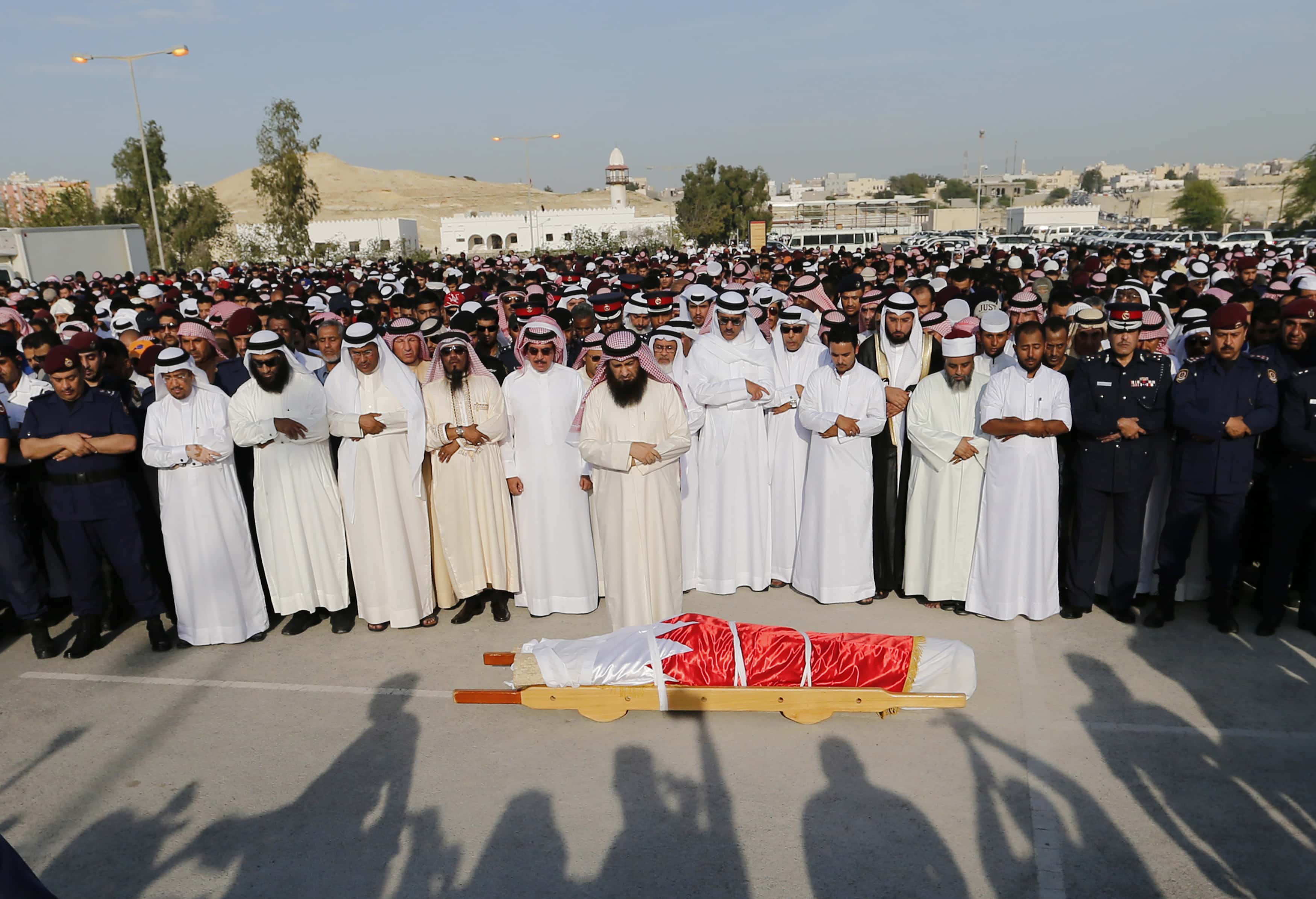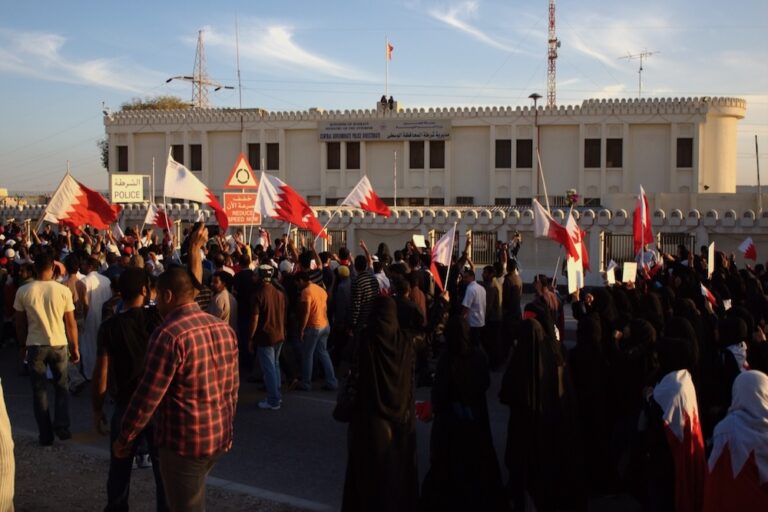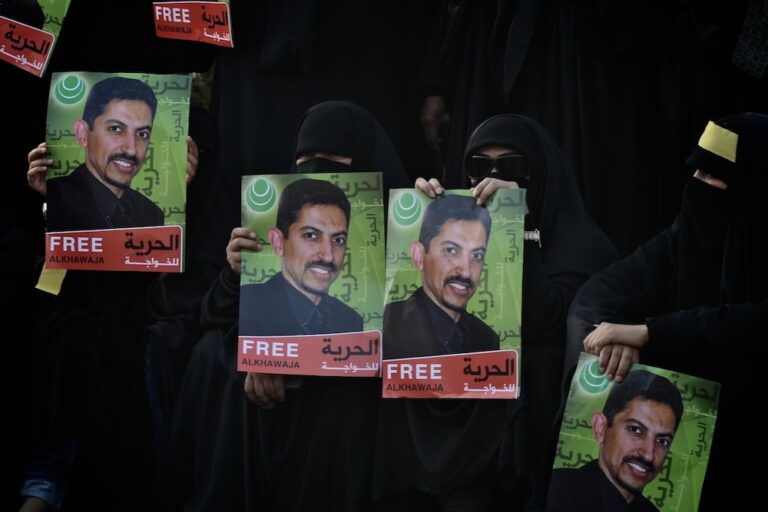The protest movement, which started peacefully and remains largely peaceful, has witnessed a slow turn of splinter groups towards the use of violent tactics. Bahraini rights groups stated that the government bears full responsibility for the escalation of violence in the country given its relentless crackdown.
The undersigned NGOs express in the strongest terms their concern in regards to the escalation of violence in Bahrain and the use of foreign security forces to police peaceful protests under the guise of secretive Gulf security agreements.
For the past three years, the Gulf Cooperation Council (GCC) states have stated that foreign troops have not been involved in suppressing the peaceful protest movement, but the death of an Emirati policeman in the village of Daih has highlighted this problematic issue.
Since the beginning of the popular uprising in Bahrain in February 2011, numerous local and international organizations have documented ongoing widespread and grave human rights violations in the country, which have created an environment of fear, as well as an infringement on the most basic civil and human rights.
After numerous civilian deaths, many in the form of extrajudicial killings carried out by security forces, and countless arbitrary arrests, systematic physical, psychological and sexual torture, as well as the continuous use of excessive force; evidence confirmed by the findings of the Bahrain Independent Commission of Inquiry shows that avenues of peaceful dissent have effectively been crushed.
The protest movement, which started peacefully and remains largely peaceful, has witnessed a slow turn of splinter groups towards the use of violent tactics. Most of the human rights activists in the country are either imprisoned or exiled and the government’s willingness to reform and enter into a genuine dialogue continues to be an unfulfilled promise three years on.
It is the responsibility of the state to take the necessary measures towards political reconciliation rather than resort to security measures that could escalate into a full-blown violent conflict as human rights activists have been warning over the past three years.
Following the death of a protester, Jaffar al-Durazi, in police custody, the authorities in Bahrain stated that an explosion targeting police killed three policemen in Daih, one of whom was Emirati, and injured others on the 3 March 2014.
This has again highlighted the problematic use of foreign security forces and politically naturalised officers in violating human rights and the exercise of the right to self-determination, as well as the claims that GCC forces have not had any involvement in direct policing of protests.
Following the death of the three policemen, security forces went on a rampage breaking cars in Daih. In less than 24 hours, and after numerous house raids in multiple areas, the Ministry of Interior announced the arrest of 25 individuals links to the “explosion”.
During this period, there was an attack on the AlWefaq headquarters, calls for sectarian attacks, and the Ministers Council issued a decision listing the February 14th Coalition, the Saraya AlAshtar and the Rebellion Movement as well as anyone related to them as terrorists groups. This may be used to target human rights defenders and organizations under the pretext of fighting terrorism.
Since the beginning of the uprising, the undersigned NGOs have called on the government of Bahrain to halt the use of excessive force, and allow people the right to peaceful assembly and freedom of expression; warning that the continuation of suppression will escalate violence.
Not only has the government of Bahrain completely ignored calls from civil society, but the human rights situation has further deteriorated with not only the suppression of protests, but also the passing of laws and amendments to laws that further limit and infringe on basic civil and human rights.
The undersigned NGOs collectively reiterate that we do not condone violence under any circumstance; nevertheless we strongly believe that any form of violence is never a justification for further human rights violations carried out by government forces. It has been the case that after every statement from the authorities of an attack on police, residential areas are put under lockdown, homes are raided, and people are arbitrarily arrested.
Those individuals are usually then tortured into making forced confessions for their alleged involvement in the attack, and those confessions are the evidence used against them in court. Calls for sectarian violence have also escalated from individuals linked to the government on social media, and the use of sectarian targeting during arbitrary arrests.
The government of Bahrain bears full responsibility for the escalation of the violence in Bahrain given its relentless three-year-crackdown. The undersigned NGOs call for international pressure on Bahrain to force a process of fundamental reforms and to initiate an immediate process of reconciliation, as well as the immediate halting of suppression as a response to legitimate popular demands.
Based on the above, the undersigned NGOs demand:
- Citizens be allowed to exercise the right to self-determination, the right to peaceful assembly and freedom of expression [International Covenant on Civil and Political Rights and the International Covenant on Economic, Social and Cultural Right]
- The formation of a non-governmental independent and neutral commission, with UN supervision, to investigate all deaths that have occurred since February 2011.
- Halting the use of politically naturalized persons, and foreign security forces; the police and military should reflect, in a demographically representative manner all parts of society while advocating for greater transparency of GCC security agreements.
- Reforming the judiciary to bring it to international standards of due process and fair trials. We consider all the rulings emanating from the current system to be in violation of the rights to fair trials and all those convicted on politically motivated charges should be released.
- The initiation of a process of real accountability of all those involved in human rights violations, especially those with administrative responsibility and holding Bahraini officials accountable internationally, especially through international mechanisms like the United Nations, visa bans, and sanctions.
- The scheduling of an urgent visit for all six UN Special Rapporteurs that have requested visits, especially the rapporteur on torture, to Bahrain.
Signatories:
Bahrain Center for Human Rights
Americans for Democracy and Human Rights in Bahrain (ADHRB)
Bahrain Institute for Rights and Democracy (BIRD)
Bahrain Youth Society for Human Rights (BYSHR)
Bahrain Human Rights Society (BHRS)
European-Bahraini Organisation For Human Rights (EBOHR)



